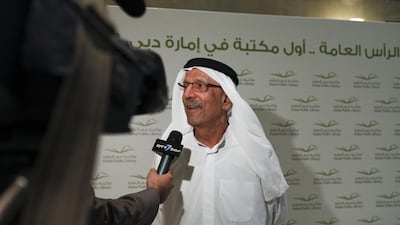DUBAI // When the first public library in the country opened in 1963 it contained a meagre 3,000 books, plus an assortment of gazettes and religious texts, all of which were donated from overseas governments.
Today, the Dubai Central Library in Al Ras has grown to four times its original size, with its catalogue spilling out to seven other branches across the emirate, which collectively house 500,000 books.
On Sunday, the 50th anniversary of the library’s opening was celebrated by Dubai Culture in Al Mamzar, Dubai.
Sheikh Majid bin Mohammed bin Rashid Al Maktoum, the chairman of the authority, praised the officials who were involved in the establishment of the library, as well as those who have had a role in its development.
“I am pleased that I am one of those who contributed in establishing the library at that time,” said Abdul Ghafar Hussein, the chairman of the UAE Humanitarian Society.
Mr Hussein, 77, was 27 when he served as assistant director general of Dubai Municipality, where his responsibilities included the commissioning of the library.
“I am very happy that I am here today so I can see how happy other people are about the library,” he said.
The collection was started from donated books, primarily from Qatar’s national library, which had opened a year before.
A proportion of the books were donated from the British political representative in the region, in the years before the UK established a UAE embassy.
“They were the most well known and first books about the region at the time,” said Mr Hussein. “They were mostly all in English but some were translated into Arabic.
“If you went to the library at that time, you’d find many books in English.”
He said the library’s initial success was mostly down to its location near a school, which has since been demolished.
“Everyone was interested when it opened,” he said. “It was the only place that had a big collection of books and was air-conditioned, so students were going there, especially during the summer.”
Nasser bin Ahmad Al Serkal, 20, a student at the American University of Sharjah, remembered that his great grandfather, Nasser bin Abdullatif Al Serkal, a former municipality employee, donated a large portion of his personal savings to help establish the library.
“He was interested in the written word and was considered one of the cultural elite at the time,” he said.
“He had his own private library, one of the biggest at the time and many of his ancestors had written books. He was brought up in an environment where people used to read and write and wanted others to have the same opportunity.”
Abdulrahman Ibrahim Abdulrahman, the director of public libraries department at Dubai Culture, said so far this year more than 100,000 books had been borrowed.
“The number is growing,” he said.
The authority manages eight libraries, including the original in Al Ras, Hor Al Anz, Al Rashidiya, Al Safa, Umm Sequeim, Hatta, Al Towar and Al Mankhool. It has more under consideration.
“We want to open a new branch in new Dubai,” he said. “Somewhere like the Marina, where there is a large community, but we still haven’t decided where.”
During the ceremony yesterday, Sheikh Majid praised the role of Dubai’s libraries in driving the city’s cultural development.
“For 50 years, the Dubai Public Library has served as the cornerstone for community members to meet and exchange ideas, while driving intercultural dialogue,” he said.
“These individuals and organisations, all of whom we are honouring today, have been crucial in defining Dubai’s literary scene by lending unconditional support to ensure that the written word is forever preserved.
“These creative spaces will continue to serve as the incubator for our future generations who will drive the success of our country in the years to come.”
mcroucher@thenational.ae

